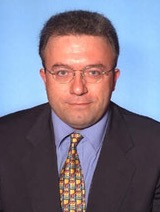Francesco Storace
|
The Honourable Francesco Storace |
|
|---|---|
 |
|
| President of Lazio | |
|
In office 12 March 2000 – 2 May 2005 |
|
| Preceded by | Piero Badaloni |
| Succeeded by | Piero Marrazzo |
| Minister of Health | |
|
In office 23 April 2005 – 10 March 2006 |
|
| Prime Minister | Silvio Berlusconi |
| Preceded by | Girolamo Sirchia |
| Succeeded by | Silvio Berlusconi |
| Personal details | |
| Born |
25 January 1959 Cassino, Italy |
| Nationality | Italian |
| Political party |
Italian Social Movement (1980s–1995) National Alliance (1995–2007) The Right (2007–2017) National Movement for Sovereignty (2017–present) |
| Profession | Politician, journalist |
| Religion | Roman Catholicism |
Francesco Storace (born 25 January 1959 in Cassino, Lazio) is an Italian politician.
He began his career at the right-wing newspaper Il Secolo d'Italia, until entering the ranks of the far right party Italian Social Movement (MSI) and later of National Alliance (AN) after repudiation of extremism. He was elected to the Chamber of Deputies for the first time in 1994. At the time he was the spokesman of Gianfranco Fini. From 1996 to 2000 he was chairman of the bicameral Commission supervising the RAI.
In April 2000 he was elected President of Lazio. Among measures taken by Storace there was the opening of Sant'Andrea hospital and other health centers. His health management of Lazio won praise for Giulio Andreotti and some members of the Vatican curia.
In 2005 he failed the re-election, defeated by the centre-left candidate Piero Marrazzo. He was subsequently named Minister of Health in the Berlusconi III Cabinet.
In March 2006 Storace was involved in the so-called Laziogate scandal, leading to his resignation from the government. He is suspected to have illegally exploited informatics mean to investigate the memberships of the new party founded by Alessandra Mussolini, a former member of AN who was one of his rivals in the 2005 regional election. In October 2012 Storace was acquitted, because "the crime does not exist".
On 10 April 2006 he was elected to the Italian Senate in Lazio, where he was at the head of the party list.
...
Wikipedia
